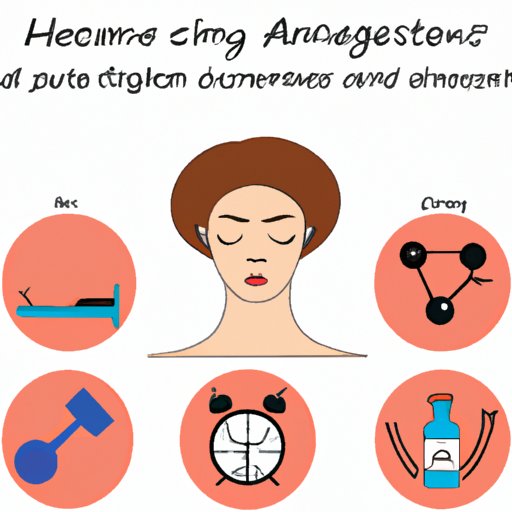
I. Introduction
Hormones are chemical messengers in the body responsible for regulating various physiological functions, such as growth and development, metabolism, mood, and reproduction. When hormones are imbalanced, they can lead to a range of health issues, including weight gain, fatigue, mood swings, irregular periods, and acne. Therefore, it is essential to regulate hormones to feel and function at our best. In this article, we will discuss how to regulate hormones naturally to manage hormone imbalances and hormonal acne effectively.
II. Hormone Imbalances: Causes and Symptoms
A hormonal imbalance occurs when there are too many or too few hormones in the body, disrupting the normal functions. Hormonal imbalances can occur due to various reasons, such as stress, poor diet, sedentary lifestyle, medication, and underlying health conditions. The symptoms of hormonal imbalances vary depending on which hormones are affected and the severity of the imbalance. Some common signs include:
- Fatigue or low energy levels
- Weight gain or difficulty losing weight
- Mood swings, irritability, or anxiety
- Changes in appetite or cravings
- Irregular periods or heavy menstrual bleeding
- Insomnia or poor sleep quality
- Acne or skin issues
III. “7 Natural Ways to Help Regulate Your Hormones”
Lifestyle changes can be helpful to balance hormones naturally without any medication or hormone therapy. Here are seven natural ways to regulate hormonal imbalances:
- Eat a balanced diet: Consume a diet high in fiber, protein, and healthy fats, such as nuts, avocado, and fatty fish. Avoid processed, sugary, and fried foods that can cause inflammation and disrupt hormones.
- Reduce stress: Chronic stress elevates cortisol levels, leading to hormonal imbalances. Incorporate relaxation techniques like yoga, deep breathing, or meditation to reduce stress levels.
- Get enough sleep: Sleep deprivation disrupts the circadian rhythm, leading to hormonal imbalances. Aim for at least 7-8 hours of sound sleep every night.
- Exercise regularly: Physical activity helps release endorphins, which can improve mood and reduce stress. It also helps regulate insulin and cortisol levels, reducing the risk of hormonal imbalances.
- Use natural skin care products: Many conventional skincare products contain chemicals and toxins that can disrupt hormones. Choose natural, organic, and non-toxic skincare products.
- Reduce exposure to toxins: Synthetic hormones, pesticides, and other toxic chemicals can mimic hormones in the body, leading to imbalances and related symptoms. Use natural cleaning products, avoid plastic containers and reduce exposure to cigarette smoke.
- Manage weight: Being overweight or obese can lead to hormonal imbalances, particularly in the case of insulin and androgens. Maintain a healthy weight through a nutritious diet and exercise routine.
These natural remedies help balance the hormonal levels and may alleviate the symptoms associated with hormone imbalances.
IV. Hormonal Acne: How to Treat the Breakouts from the Inside Out
Acne can occur due to hormonal imbalances, particularly with androgens and insulin. Acne is a chronic skin condition that causes pimples, blackheads, and whiteheads on various parts throughout the body. Here are some effective ways to manage hormonal acne:
- Diet changes: Cut down on sugar, dairy, and high glycemic index foods that can spike insulin levels and cause inflammation.
- Supplements: Supplements such as Zinc, Omega-3 fatty acids, and Vitamin D can help reduce inflammation, improve skin health and regulate hormone levels.
- Topical treatments: Use over-the-counter topical treatment products that contain salicylic acid or benzoyl peroxide that helps reduce acne-causing bacteria.
Hormonal acne can be challenging to manage, but these strategies can help prevent outbreaks and improve skin health.
V. The Power of Exercise for Hormone Regulation
Physical activity is an effective way to manage hormonal imbalances and reduce the risk of chronic diseases. Exercise helps regulate hormone levels like cortisol and insulin, boosts metabolism, improves mood, and reduces inflammation. Here are some benefits of exercise for hormone regulation:
- Improves Insulin Sensitivity: Exercise helps muscles use glucose that helps in reducing insulin resistance.
- Regulates Cortisol: Exercise promotes the release of endorphins that improve mood and reduce the cortisol stress hormone levels
- Reduces Inflammation: Exercise can reduce inflammation that improves insulin sensitivity and decreases the risk of chronic disease.
- Reduces Estrogen: High levels of estrogen in the body can lead to hormonal imbalances. Exercise can promote the regulation of estrogen levels in the body.
Therefore, make an exercise routine a priority as regular inactivity may lead to hormonal imbalances and poor health outcomes.
VI. The Role of Sleep in Hormone Regulation
Good quality sleep is crucial to hormone regulation. Sleep is necessary to regulate the circadian rhythm, the body’s internal clock, which controls hormone levels, eating patterns, and metabolism. Here are some tips to improve sleep quality:
- Develop a bedtime routine: Establish a consistent bedtime routine that includes relaxing activities like reading a book or taking a warm bath to help your body relax.
- Avoid stimulants: Avoid consuming caffeine, nicotine, and alcohol close to bedtime, as they can disrupt sleep.
- Create a sleep-conducive environment: Make the sleep environment conducive for sleep, including comfortable bedding, proper room temperature and light conditions.
- Reduce screen time: The blue light emitted from electronic devices can interfere with the natural sleep cycle, so it’s best to stay away from screens before bedtime.
By prioritizing sleep and following these tips, one can improve the quality of their sleep, experience a reduction in stress, and balance hormone levels.
VII. Conclusion
Hormones are essential for the proper functioning of our bodies. Hormonal imbalances can affect our well-being, including weight, mood, and skin health. However, by making lifestyle changes, exercising, getting enough sleep, and eating a balanced diet can improve our hormonal profile, thus reducing the incidence of hormonal imbalances. Small changes can go a long way in balancing the hormones naturally.
Regulating your hormones is essential for good health, and by implementing the strategies we’ve discussed, you can take a step towards improving your overall health and well-being.




